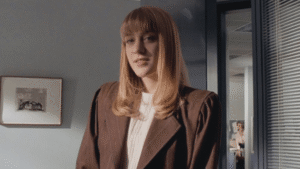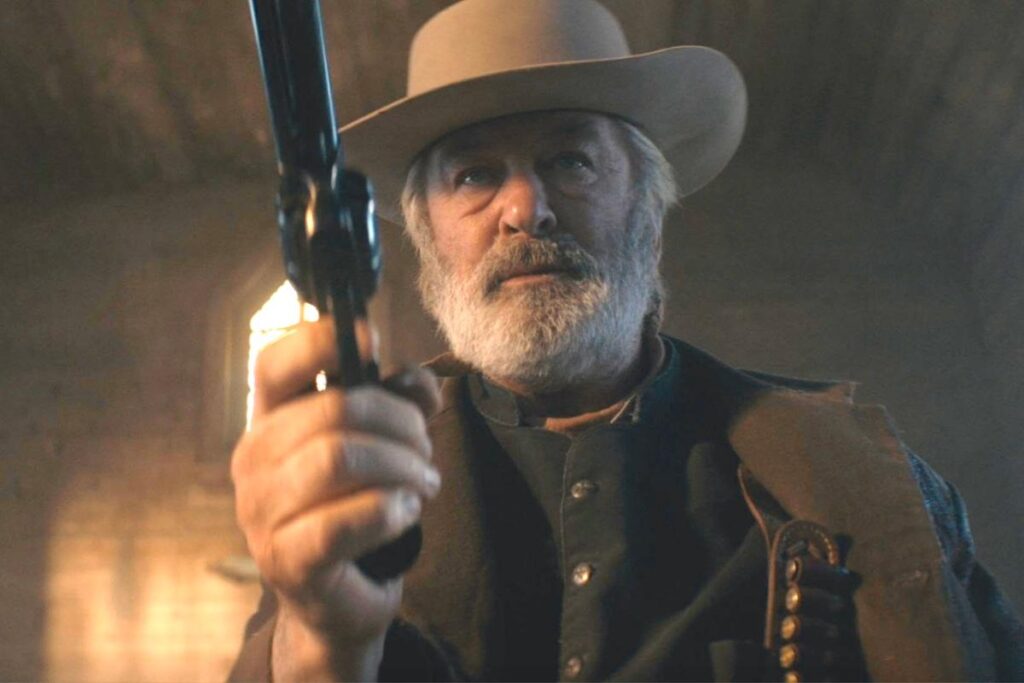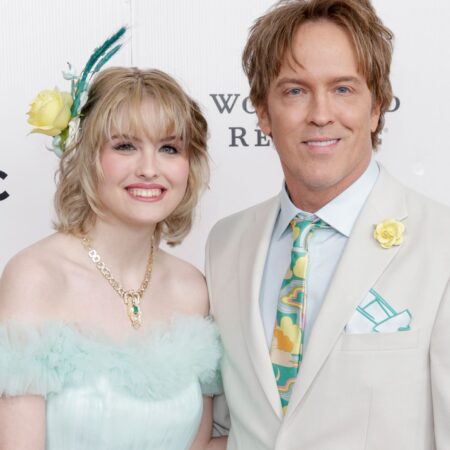The official release of Rust (now streaming on VOD platforms like Amazon Prime Video) might finally put a bookend on a long, sad story. You’re likely aware of the tragedy of this throwback Western’s making, recently chronicled in the documentary Last Take: ‘Rust’ and the Story of Halyna – midway through filming in Oct., 2021, cinematographer Halyna Hutchins was accidentally killed on set when a prop gun held by star and producer Alec Baldwin discharged a live round. Director Joel Souza was also injured by the bullet. Lawsuits and intense media coverage followed, with some cast and crew members bearing criminal responsibility; involuntary manslaughter charges against Baldwin were thrown out of court (a moment captured in reality series The Baldwins, which pushes the actor’s response to these events firmly into the ick zone). Once legal proceedings concluded, filming resumed, in tribute to Hutchins, per the filmmakers. Notably, the production delays forced partially filmed roles to be recast, and the movie was finally completed in May, 2023. And now Rust can at last be seen, perhaps primarily to appreciate Hutchins’ work, if viewers can contend with watching such a haunted movie – especially since its plot is instigated by gunfire causing an unintended death.
RUST: STREAM IT OR SKIP IT?
The Gist: Wyoming, 1882. Lucas (Patrick Scott McDermott) arises at sunup to feed the hogs and chickens. He’s about 13, maybe 14 years old, and caring for his little brother Jacob (Easton Malcolm). They’re orphans, barely scraping by. The cupboard’s bare, their parents’ graves loom on a nearby hillside, and a wolf keeps eyeing their animals. “Lucas, what did Mama look like?” Jacob asks. “I can’t remember,” Lucas replies. They wagon into nearby Hayesville and sell a couple of pigs and a horse so they can eat. In the general store, a bully hassles Jacob and Lucas bashes the kid’s hand with an ax handle. Later, back at the ranch, Lucas spies that pesky wolf again. He grabs his father’s rifle. Chases it. Lines it up in his sights. Squeezes the trigger. Misses. But he didn’t see the bully’s father, riding up to force Lucas to do the work his injured boy can’t. The man takes the bullet. He falls off his horse. Dead.
There isn’t much deliberation. The judge deems the act premeditated and doesn’t seem particularly hesitant to sentence Lucas to death by hanging. Jacob goes to a boy’s home and Lucas curls up in the corner of a cell. Lucas’ grandaunt (Frances Fisher) rides into town, and considering her mention of lawyers, seems to be a person of significant means. She’s too late to influence the decision. And so one night Lucas hears a ruckus in the sheriff’s office. Scuffling, bumping, bonking. A shadow walks into the holding area, unlocks the cell. “You don’t look like much,” the shadow says to Lucas. He ushers the kid out past the bloody bodies of two deputies, to freedom. Sort of.
The shadow? Once it ceases being so dang gruff all the dang time, it identifies itself as Harland Rust (Baldwin), Lucas’ maternal grandfather. “You’re a murderer,” says Lucas. “That’s something we have in common,” Harland gravels. Don’t worry, kid – this movie can be harsh and violent, but it seems to be the type where the grizzled grayhair warms up to the greenhorn next to a crackling campfire. Eventually, anyway. Harland has a contact in Mexico, so that’s where they’re headed. Now we meet U.S. Marshal Wood Helm (Josh Hopkins). His wife weeps over their son, coughing, wheezing, dying in bed. Wood absorbs the brunt of her anger and grief and wordlessly goes to work, examining the dead deputies and piecing together Harland’s involvement. Old man Rust has a rep – lots of dead bodies and bombed banks litter his wake. Wood gathers up a posse and heads after Harland and Jacob, while a $1,000 bounty stirs mercenaries like Fenton “Preacher” Lang (Travis Fimmel), with the piercing blue eyes and facial scars, to saddle up. It seems fate has some cards to play.
What Movies Will It Remind You Of?: Stepping past the similar tragic backstory of Brandon Lee and The Crow, dashes of erudite dialogue in Rust gives me Deadwood flashbacks, while big-cinema Westerns like Clint Eastwood’s Unforgiven and a bevy of John Ford classics are clear touchpoints.
Performance Worth Watching: Among a wide arrangement of weathered male mugs, Hopkins stands out as the cast member with the most going on beneath the concerned looks and poker faces – grief, mostly, at the state of things. Too many things, to be honest.
Memorable Dialogue: Wood contemplates the state of his ailing son – and the world at large: “I knew a long time ago that there ain’t no god. Would’ve been nice to be wrong, though.”
Sex and Skin: None.
Our Take: There’s a scene in Rust where Lucas asks his grandfather if he’s ever seen a man be hanged, and Harland’s reply is, “That ain’t the kind of thing a man should dwell on.” Decontextualize that statement a bit, and it becomes clear that one shouldn’t linger on death and court morbid obsession, a sentiment that supports the decision to release Rust in tribute to Hutchins. For what inevitably is a core flaw of stonefaced men in Westerns but their attempts to compartmentalize their pain and misdeeds, and allow their grief to go unprocessed, unacknowledged? All this may be true to an extent, but that doesn’t make watching the film any less of a ghoulish experience, knowing what happened to Hutchins, as outlaws and lawmen and those in-between frequently exchange gunfire, exacting mortality upon each other and trauma upon loved ones and those bearing witness. It’s a terrible, terrible irony.
In spite of the woe in its making, there’s enough beneath the surface of Rust to overcome its flaws: A languid pace and 139-minute run time, begging for a tighter edit; a collection of anonymous supporting characters, all grubby white guys we can’t tell apart, be they outlaws or wearing badges; a propensity for genre cliches; the nagging sense that Baldwin doesn’t fit comfortably in a spurs-and-saddles role. Details of character motives sometimes waver toward nonsense. An attempt to establish Preacher as a foil to Harland is underdeveloped and lacks intensity. The film struggles to maintain sustained tension for more than two hours. Its melancholy tone is sometimes broken up by awkward stabs at comic relief (courtesy a pair of bounty-hunting cowpokes who can’t stop squabbling). It all barely hangs together at times, and flirts heavily with mediocrity.
But is it coincidence or hindsight that the movie eschews traditional Western themes of hardship and redemption, and is instead about grief? Hutchins’ cinematography (aided by Bianca Cline, who took over to complete the film), capturing the rugged glory of the American West in sunsets, sunrises and subtly gloomy golden hours, and the candle- and torch-lit oranges and browns of nighttime interiors, ends up being the optimistic flipside of this movie’s coin of fate. The world can be cruel; the world can be beautiful. Whether you want to bear the burden of watching it is the question.
Our Call: Watching Rust in tribute to Hutchins seems noble to me – an act of hope, maybe. So STREAM IT, but know what you’re getting into first.
John Serba is a freelance writer and film critic based in Grand Rapids, Michigan.
Read the full article here








